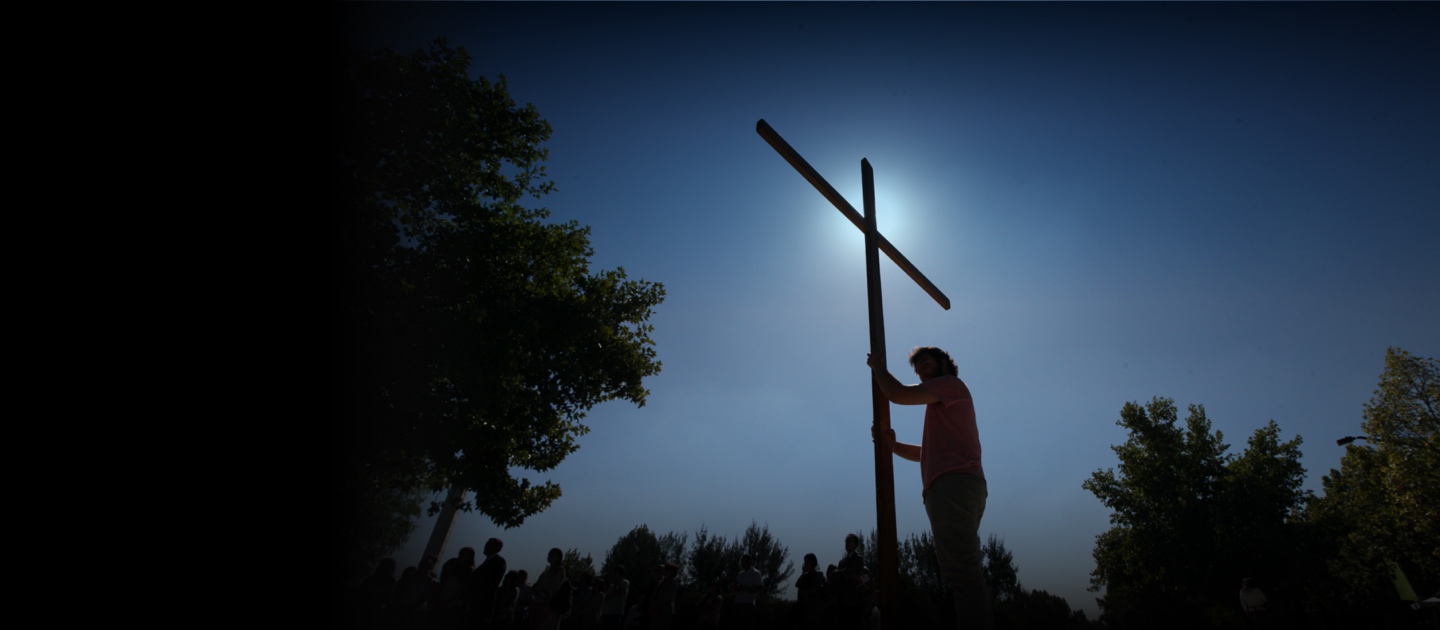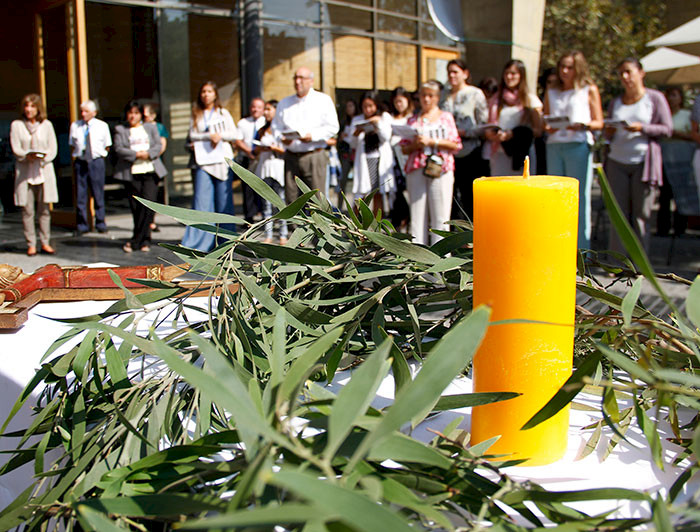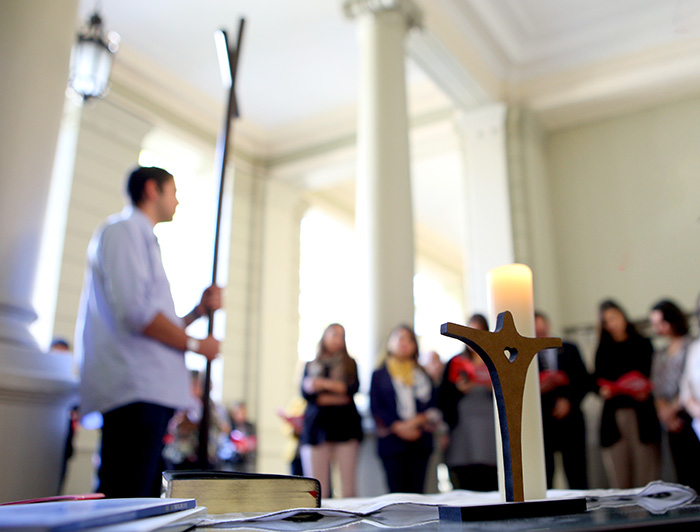
Four meaningful ways to seize the Holy Week in community
After two pandemic years, this Holy Week is an occasion to pray together as a community again. Therefore, the Office of Campus Ministry & Christian Culture emphasizes the significance of reunion in each of the masses and liturgies held on different campuses.

photo_camera UC Chile's five campuses will hold spiritual retreats, liturgies, Via Crucis and Masses to gather the university community again around this liturgical time. (Photo: Karina Fuenzalida)
For the first time in two years, we will celebrate Easter Week at the university campuses —always considering the care and prevention measures against Covid-19.
UC Chile's five campuses will hold spiritual retreats, liturgies, Via Crucis and Masses to gather the university community again around this liturgical time.
The activities will be the traditional ones. However, on this occasion, the Office of Campus Ministry & Christian Culture (known as Pastoral UC Chile among the community) wanted to emphasize the value of reunion.
"The Holy Week is always a special opportunity for Christians to meditate on the great mysteries of our faith at the end of Lent. And, after the pandemic, we have the extraordinary joy of meeting again. It is important because the Church is and lives through the community," says Father Jorge Merino, University Chaplain of UC Chile.
"There is a risk that Holy Week passes us by as just another week in the year in our busy lives. Therefore, we can propose ourselves to dedicate a daily moment to remember that this week is different," suggests the priest.
Considering the war in Ukraine, the tough time of the pandemic, and our country's changes, we need harmony and peace.
Father Merino emphasizes: "We can come to this Holy Week considering how to create a better existence. How we can be an agent of peace in our environment."
Seize family and friends
Haddy Bello, an academic of the Faculty of Theology, explains the emphasis could be on the reunion and the search for peace this year.
"During the Holy Week, let's take the opportunity to be with our families and friends, with whom we have distanced ourselves for covid or other reasons. Without reunion and unity, peace will be farther away," he says.
"The situation in Ukraine requires us to think about family, affection, tolerance, respect and love for others' recovery. But it is unnecessary to look so far. We can start by looking to our closest family and friends. Then broaden our gaze to our community and country," recommends professor Bello.
Heriberto Cabrera, a Salesian priest and academic of the Faculty of Theology, says we must remember the pandemic suffering was in our homes' intimacy.
"On the Holy Week, we gather to celebrate the light, Christ Himself, who overcomes darkness, the life that overpowers death. This year's event is meaningful because it encounters us, marked by "death". We have lost loved ones during the pandemic, and there are still sick people. Others are still having a hard time because they lost their jobs. Chile is going through a challenging time. There is a lot of mistrust and an insecurity feeling. People look glum and belligerent. That is why Easter is a moment of hope".
And the professor continues:
"Easter is a promise to all of us. A promise that life is stronger than death. After the storm comes calm, a new, different life makes us new creatures. The "paschal-believer" aspires to go beyond survival. We want the promise of a full life so that they will not perish without having drunk every last drop it offers."
Four Recommendations for self-reflection during the Holy Week:
- Read the Holy Week book prepared by Pastoral UC Chile. The text reviews the Via Crucis reflections, with 14 meditations corresponding to each station. It also includes 14 good deeds, spiritual and physical, inspired by the 2016 World Youth Day's Via Crucis (held in Kraków), but with updated texts.
- Define a daily gesture of prayer or service that reminds you that we are in Holy Week.
- Find a place in your house to put an image or crucifix that allows you to pray every day.
- Approach the nearest parish to know the schedule of masses and retreats during the holidays.
Four Suggestions to live the Holy Week in the community:

Bernardita Aspillaga, director of the University Community Office from Pastoral UC:
"It is a moment to participate in the different activities of Holy Week that are available on all campuses. We will have Palm Monday, a retreat for academics, a reflection vigil for students, participatory Via Crucis and Resurrection Mass. We have also prepared two talks on the representations of Jesus in the cinema from a historical and faith perspective."
Father Jorge Merino, University Chaplain:
"Use the book that we have prepared from Pastoral UC Chile. Its objective is for people to live these holy days in the community through prayer, meditation, and encounters. To be attentive and ready to listen, meet, and talk with others. It contains Holy Thursday, Friday and Saturday, and Easter Sunday reflections. You can enter at any stage of the Easter Triduum and find questions for dialogue or self-reflection."
Professor Haddy Bello:
"You can celebrate Holy Week in family or community, among friends or reuniting with the most dispossessed people. We can celebrate life because the essence of the Passion, Death and Resurrection of Jesus is not the suffering on the cross but the release from death through the cross's sacrifice."
Professor Heriberto Cabrera:
"After the pandemic, we can receive the Holy Week traditions as a gift and a certainty. We can recognize ourselves: death, sadness, failures or evil does not have the last word. Nevertheless, deep within ourselves, something or someone tells us that it is worth continuing to hope, that we are not alone, and that the impossible can be possible. What happened to a young carpenter in Nazareth can happen again to a young university student, administrator, service personnel, or academic. And this is: to believe that life has meaning to be lived. We were not born for death, but life. Moreover, we were born for eternal life. That is why I wish you many Easter celebrations in your lifetime."


